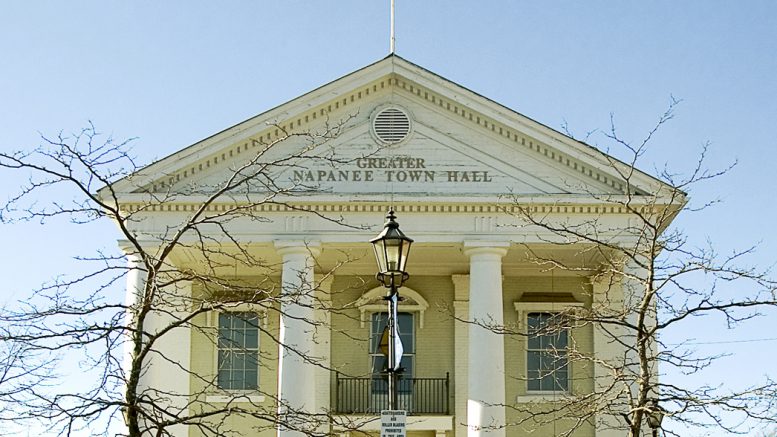Adam Prudhomme
Beaver Staff
Unsure of the legality of their proposed urban/rural tax rate for policing costs, Greater Napanee council has opted to formally submit a series of questions to the provincial government.
Councillor Max Kaiser, who made the original motion to adopt ‘method four’ of the taxation policy review back in August 2016, made the successful motion to submit the questions to the provincial government last Tuesday. It passed by a vote of 5-2, with councillors Shaune Lucas and Carol Harvey voting no.
By submitting the questions, council will be making good on Kaiser’s original motion, which called for this term of council to seek dialogue with the OPP and/or the provincial government to see whether or not calls for services can be area rated within a given municipality. That vote passed 6-1 at the time, with Lucas casting the lone no vote.
The questions, which have been put together by chief administrative officer Ray Callery are:
n Does the province believe municipal councils should have the autonomy and authority to establish local levy areas within a municipal political boundary, to reflect differences in calls for service data?
n Given that larger areas detachments resources are shared over the reduced influence of local municipal councils to deal with policing issues, does the province agree that calls for service should be billed equally within the detachment or police service board area as opposed to municipal political boundaries?
n Given the community safety plans will attempt to establish the best way to reduce future needs for calls for service in a municipality and that the majority of agencies represented on municipal planning committees will have very broad organizational areas of influence, does the province agree community safety plans should be developed for OPP detachment areas or police service board areas instead of municipal political boundaries?
“There’s no way they’re going to give us an answer with an election coming up in June,” said Lucas. “For all likely purposes, there could be a change of government, a change of philosophy. We’re not just looking at policing, we’re talking everything we deal with as a municipality. Policies could change for everything, not just policing.”
Lucas pointed to the fact that the town had already spent $100,000 on taxation studies, as well as many more working hours from Callery who put together the report to submit to the Ontario government.
“The provincial government right now is a lame duck,” said Lucas. “You’re not going to get an answer. How much more money do you want burn on a question, for the most part can’t be answered tonight? A non-answer to me is an answer.”
Harvey agreed.
“I can not support this,” Harvey said of contacting the provincial government. “After probably over $150,000 and having professionals give us the answer to fair taxation, I’m hearing tonight even if the minister says no, we’re still going to try and do that illegally.”
Deputy mayor Marg Isbester voted to go ahead with submitting the question, citing no one knew for sure whether or not they’d get an answer or not.
“I don’t think councillor Lucas is completely wrong that we may not get an answer,” said Isbester.
“But I don’t think a non-answer is an answer that it can’t be done. Money invested or not, how can you stop the process part way through? We have to keep going with it to get an answer, then it’s up to us to make a decision. We’re not asking them to tell us what to do, we’re asking ‘what can we do’?”
Council will now await the province’s answer before taking the next step in their process of determining whether or not policing can be area rated.

